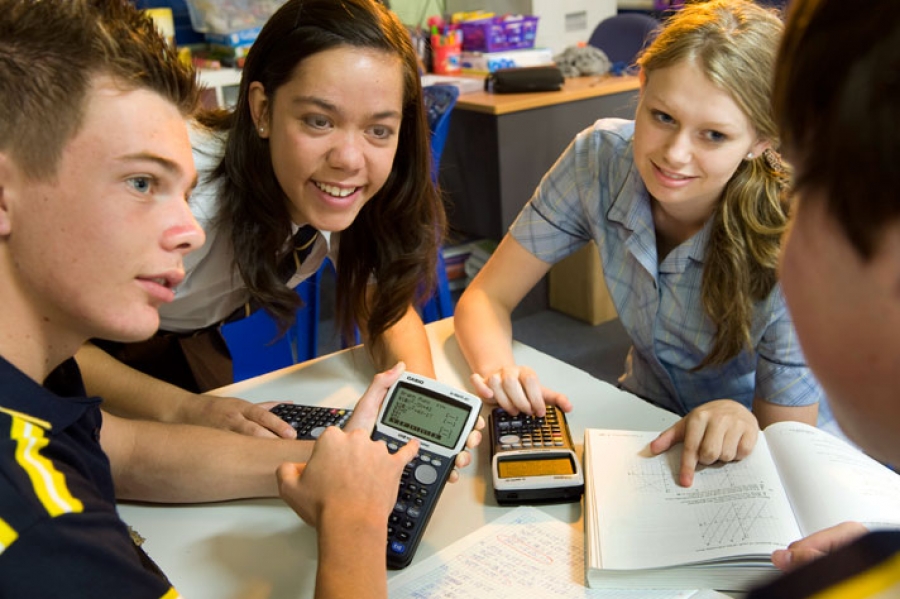From accounting to engineering and from geophysics to design, mathematics is arguably the single most important discipline driving technological growth and innovations. It embraces the skills, knowledge and life tools valued and needed by employers and societies worldwide.
Studying mathematics develops creativity and skills in problem solving, modelling and research, all of which can be applied in professional and everyday life - the possibilities are infinite!
Mathematics at Salisbury High School is increasingly taught within a context which promotes an appreciation of the usefulness, power and beauty of the subject. It is essential that students are equipped with a solid foundation and are equipped with related skills base mathematically related skills and attitude to enable them to adapt as their needs and knowledge change.
Extensive use of technology, such as graphics calculators and computers, is integrated into the curriculum which assists with the exploration of more complex real-life situations than otherwise be possible.
Students study Mathematics under the frameworks of the Australian Curriculum. Topics are covered under the six interrelated strands of Number, Algebra, Measurement, Space, Statistics and Probability. The mathematics curriculum focuses on developing and refining students’ capabilities in fluency and flexibility, understanding, reasoning and problem-solving. These capabilities enable students to respond to familiar and unfamiliar situations by employing mathematical strategies to make informed decisions and solve problems efficiently.
Numeracy skills are developed and reinforced through inquiry tasks, problem solving activities, collaborative thinking tasks and the use of the online educational program Mathletics.
Program Content:
In the middle school (7-10) all students study a full year of mathematics and assessment occurs through a variety of tasks including:
- Common Inquiry Investigations
- Tests and exams
- Numeracy Blocks, Collaborative Thinking Tasks and Daily Fluency
- Class books, Mathletics and Arrival Tasks
At least once a week, a lesson will start with an Arrival Task. An Arrival Task is a short, engaging activity that gets students brains thinking about math and ready to learn more! They build mathematical reasoning, communication, problem-solving, and further understanding and, allow students to review and practice math skills. They take many forms, including but not limited to: riddles, puzzles, quick writes.
Students across years 7 and 8 participate in 30-minute Numeracy Blocks each week. Students work in groups informed by diagnostic data and formative assessment on differentiated tasks which develop students’ skills and understanding of number, place value and multiplicative thinking (Numeracy Progression).
Students have the opportunity to specialise their studies of mathematics during year 10 by opting for an extra unit in Semester 2 which has an emphasis on algebra and geometry skills through Collaborative Thinking Tasks (students working on a thinking task in visibly random groups of 3 utilising vertical non-permanent surface).which are required for later studies in Pure Mathematics and of those students aiming for a Science/Technology/Engineering pathway at University .
In Stage 1 all students are encouraged to complete 2 semesters of mathematics. Mathematics is optional at Stage 2.
Stage 1 and 2 Subjects offered:
- Essential Mathematics (Numeracy) - This subject extends mathematical skills in ways that apply practical problem solving in everyday contexts such as shopping and shopping dockets, budgeting and analysing bills, cooking and healthy eating, buying and leasing cars and decorating. This course DOES NOT lead to any Stage 2 Mathematics course.
- Essential Mathematics (Vocational) - Prepares students for a range of industries and vocations such as automotive, building and construction, electrical, hairdressing, hospitality, nursing and community services, plumbing and retail.
- General Mathematics - All content is linked to modelling and business. Students should study this course if they are considering a pathway around high-end trades such as Mechanics Electricians. Students interested in pursuing careers around nursing, accountancy, psychology etc should also consider this course.
- Mathematical Methods - Provides the foundation for further study in mathematics, economics, computer science, and the sciences. When studied together with Specialist Mathematics, this subject can be a pathway to engineering, space science and laser physics.
- Specialist Mathematics - Must be studied in conjunction with Mathematical Methods. Students should consider this course if they have an interest in the following post-school options: Engineering, Sciences, Medicine and Pure Science.
- Maths skills for Life (Stage 2 only) - Aims to enable students to make links between their lives and aspects of maths for the purpose of developing real world maths skills and their personal capabilities through tasks around purchasing and maintaining a vehicle, getting a loan, renting a house, constructing a healthy meal and improving a personal numeracy skill for their future career.
Contact Rebecca Ludewig, Senior Leader Maths, Science and Numeracy. Email: This email address is being protected from spambots. You need JavaScript enabled to view it.


